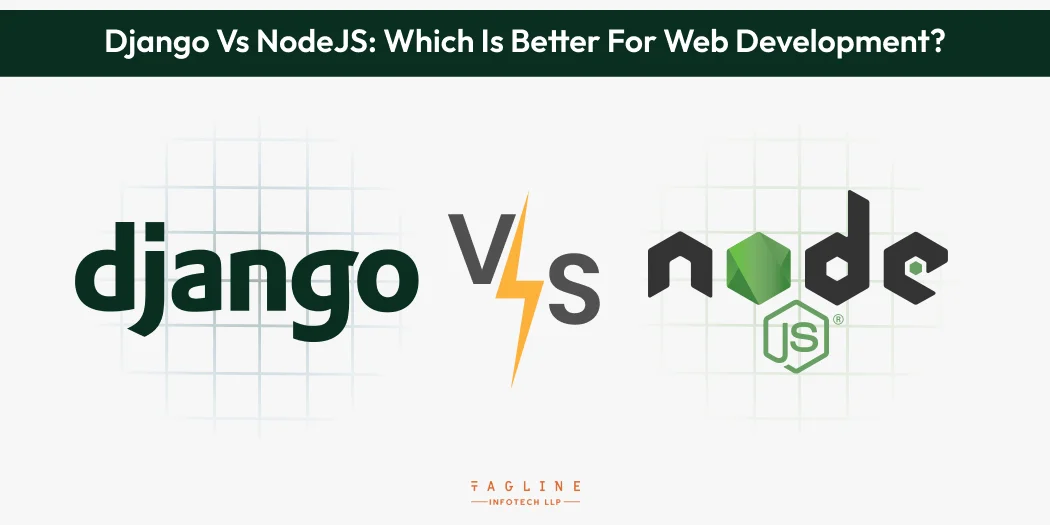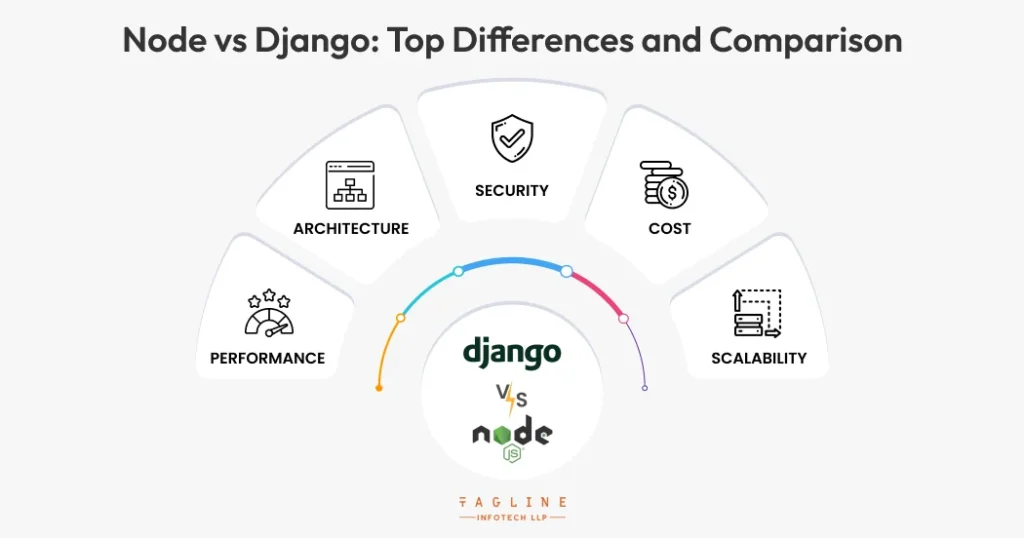Advanced Error Handling in Node.js Applications
December 13, 2024
Home >> Node.JS >> Django vs NodeJS: Which is Better for Web Development?

Quick Summary
Selecting the right backend technology is essential for the success of any web project. Django and Node.js are both strong options, each with unique benefits.
Django, a Python framework, is known for its rapid development, high security, and scalability. However, it can be challenging for those new to Python. Node.js, built on JavaScript, is fast, efficient, and highly scalable but can face callback issues. Your choice depends on project needs: Django is ideal for quick development and security, while Node.js is best for scalability and speed. This blog will help you compare Django vs NodeJS and decide. So let’s dive in!
Node.js and Django are among the top web development tools that enhance and accelerate the development process. Opting for Node.js development services or Django development service allows for the creation of dynamic web applications efficiently and swiftly. In today’s competitive market, businesses prioritize rapid development and delivery, and choosing between Node.js vs Django can significantly impact the speed and flexibility of your web application. This need for speed and efficiency has led to the adoption of tools like Django and Node.js, which facilitate quick and timely web app delivery. Partnering with a Node.js Development Company can further streamline your development process.
Django is an open-source, cross-platform web development framework based on Python. It simplifies the development process by eliminating repetitive tasks and providing a solid foundation for rapid web development. This framework is highly beneficial for developers as it addresses common development challenges.
The main features of the Django web framework include content management and user authentication, which lighten the developers’ workload and speed up the web development process. Django enjoys significant popularity, with over 70,000 stars and more than 2,000 contributors on GitHub.
Thousands of businesses, including Instagram, Pinterest, and DoorDash, use the Django web framework.
Django follows the MVT (Model-View-Template) architecture, consisting of:
Model: The business logic of a web application.
View: All the user interface components.
Template: Static HTML elements and syntax for inserting dynamic parts.
Not only this but also the Django REST framework allows for the creation of RESTful APIs, simplifying the transfer of information between a database and an interface. This streamlines web development by facilitating seamless communication with databases.
Django stands out with its robust feature set, making it highly favored among developers at any Django development company for creating efficient and powerful web applications. Let’s delve into its standout features
1. Object-relational mapper: Simplifies database queries and management by mapping objects to database tables.
2. Robust template system: Facilitates the creation of flexible and reusable templates for UI design.
3. Automatic admin interface: Generates a user-friendly admin interface automatically, easing content management tasks.
4. Quick internationalization: Streamlines the process of developing multilingual applications.
5. MVT architecture: Follows the Model-View-Template architecture pattern, enhancing code readability and maintainability.
To decide between Django and Node.js, consider Django’s advantages in web development:
Despite its strengths, Django has some considerations:
Curious about Django’s practical applications? Consider its versatility across real-world scenarios:
These examples showcase Django’s adaptability across various domains.
Node.js is not a web framework like Django; rather, it is a runtime environment for JavaScript, enabling the execution of JavaScript code outside of web browsers. This fundamental difference distinguishes Node.js from frameworks like Django.
Node.js has gained significant popularity within the developer community, boasting over 95,000 stars and more than a hundred thousand contributors on GitHub. Major companies such as Twitter, Udemy, Uber, and Slack utilize Node.js for their web solutions.
Node.js empowers developers to create fast, productive, and efficient web applications. It operates on both the client side and server side, making it a versatile choice for web development. Due to its flexibility, scalability, and high performance, Node.js is widely adopted for backend development.
Understanding what Node.js is and its advantages can help you determine if it suits your web development project. Node.js offers numerous benefits for web development.
Node.js distinguishes itself with unique features that cater to modern web development needs:
1. Asynchronous and non-blocking: Enables efficient handling of I/O operations without blocking other tasks.
2. Event-driven and single-threaded: Utilizes event loops to manage multiple concurrent tasks on a single thread.
3. Built on Chrome’s V8 engine: Harnesses the powerful JavaScript runtime for fast execution.
4. No data buffering: Facilitates real-time data streaming without intermediary buffering.
Node.js offers several compelling advantages for developers and applications:
Despite its strengths, Node.js has some limitations to consider:
Node.js finds extensive applications across various domains and scenarios:
Additionally, Node.js excels in creating RESTful APIs and other types of APIs. Consider hiring Node.js developers to leverage their capabilities in building scalable web applications and websites efficiently.

With a clear understanding of Node.js and Django, let’s delve into the key differences between Node.js vs Django.
The architecture of each technology is a fundamental factor in determining which is more suitable for your project.
Node.js: Node.js is a runtime environment designed to execute JavaScript programs outside of web browsers. It uses a single-threaded, event-driven model, allowing it to handle multiple requests concurrently with high efficiency. Node.js is compatible with any operating system, making it ideal for developing high-performance applications. This framework excels at creating fast, responsive web apps and custom web application development services can utilize Node.js to build efficient, compact web applications.
Django: Django is a web framework that employs the MVT (Model-View-Template) architecture. This structure enables developers to work on different parts of a project independently, ensuring that changes in one component do not impact others. Django’s organized approach supports the development of scalable, maintainable web applications.
Understanding these architectural distinctions helps in choosing the right technology for your web development needs, as each has unique advantages suited to different types of projects.
The performance of a web application is determined by its functionality and speed.
Node.js: Node.js uses a single programming language, JavaScript, for both backend and frontend development, eliminating the need for additional processing between the two. This facilitates seamless data exchange. Additionally, Node.js’s single-threaded model efficiently handles multiple requests simultaneously. Frequent updates and Nodе.js Pеrformancе Optimization techniques further enhance its performance.
Django: Django, built on the Python programming language, tends to be slower in comparison due to its single-threaded nature for processing requests. This means web apps built with Django may experience slower performance. While Node.js outperforms Python in terms of speed, Django can still achieve satisfactory performance with optimizations such as Varnish implementation.
In summary, while Django may not match Node.js’s speed, it can still be optimized to deliver satisfactory performance.
Security is a critical factor in deciding between Node.js and Django.
Node.js: Node.js utilizes NPM (Node Package Manager) to help developers manage security through trusted packages. In addition to NPM, Node.js offers extra security features that ensure the protection of web applications.
Django: Django prioritizes security with built-in mechanisms such as SQL injection protection and clickjacking prevention. As a comprehensive framework, Django often reduces the need for third-party libraries, which can pose security risks.
Both frameworks can achieve high levels of security with a dedicated development team addressing potential vulnerabilities.
Cost is a crucial consideration when choosing between Node.js and Django for your business.
Free to Use: Both Node.js and Django are open-source and free, eliminating license fees and saving money upfront.
Development Time: Django, being deadline-oriented, enables faster development, which can reduce overall project costs. In contrast, Node.js, while powerful, can be more time-consuming, potentially increasing development costs.
Thus, while both frameworks are cost-effective in terms of licensing, Django may offer a more economical option due to its quicker development process.
A scalable backend ensures that your web application can efficiently handle increasing traffic and usage.
Node.js: The single-threaded model of Node.js is designed to manage large volumes of traffic concurrently, providing a highly scalable backend for your web application. Its extensive library and features offer greater control over scalability.
Django: Django is also capable of managing substantial data and heavy traffic, making it suitable for scalable web applications. However, Node.js typically offers more flexibility and control in scaling.
Both frameworks support scalability, but Node.js may offer an edge with its extensive resources and control features.
When deciding between Node.js and Django, the optimal choice hinges on specific project needs. Django excels in rapid web development, whereas Node.js offers superior performance for dynamic web applications. Your decision should align closely with your project’s particular requirements. This comprehensive comparison of Django vs. Node.js has provided a thorough analysis to facilitate an informed decision. Each technology boasts distinct advantages and drawbacks, empowering you with valuable insights for your deliberation. For expert guidance and assistance in developing your web application, considering hiring our Tagline Infotech Node.js Developers. Whether leveraging Django or Node.js, our team specializes in crafting secure and scalable solutions tailored to your specifications. Connect with our specialists today to explore your project needs further.
Django offers rapid development, robust security features, and built-in functionalities like an automatic admin interface and templates, making it ideal for diverse applications with strong community support.
Node.js is ideal for real-time data streaming, high concurrency, and asynchronous tasks, suited for applications like chat tools or data-intensive apps. Django is best for projects needing rapid development, security, and structured architecture, such as content-rich websites or enterprise applications.
Node.js is less suitable for CPU-intensive tasks due to its single-threaded architecture, which can lead to performance limitations. It excels in handling I/O operations and concurrent requests efficiently.
Django is versatile, supporting applications such as content management systems, e-commerce platforms, social media sites, and enterprise-grade solutions. Its robust features and security make it particularly suitable for complex web projects.

Digital Valley, 423, Apple Square, beside Lajamni Chowk, Mota Varachha, Surat, Gujarat 394101
D-401, titanium city center, 100 feet anand nagar road, Ahmedabad-380015
+91 9913 808 2851133 Sampley Ln Leander, Texas, 78641
52 Godalming Avenue, wallington, London - SM6 8NW